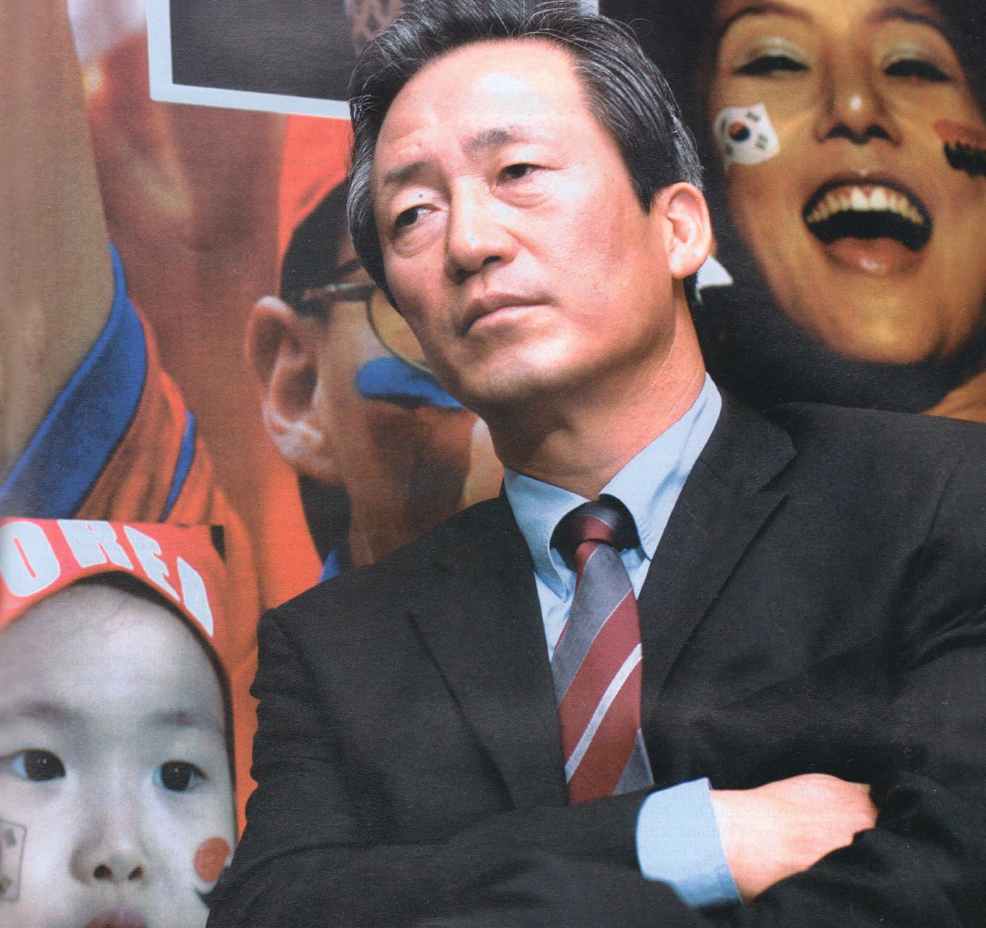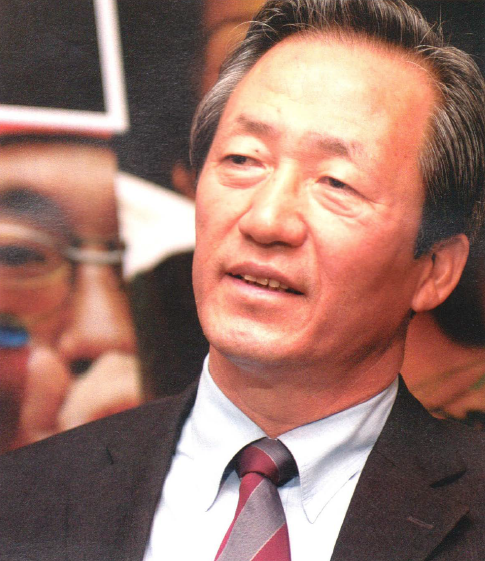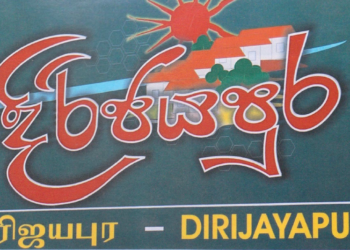By Rashmini Mather

Dr Chung Mong-joon is a man with presence.
A son of the late Chung Ju-yung, the Founder Chairman of the Hyundai Group in Korea, he hasn’t rested on his family’s laurels. Understanding the importance of education, he has a BA in Economics from the Seoul National University, an MS from MIT Sloan School of Management, USA, and a PhD from the School of Advanced International Studies at Johns Hopkins University, USA.
He was the Chairman of Hyundai Heavy Industries (HHI) during its growth period. His strong desire to serve his country and its people led to Dr Chung giving up his corporate career to pursue public service and philanthropy. He was elected to the Korean National Assembly in 1988 and is a member of the country’s parliament, serving his fifth term.
His love of football drew him to the Korean Football Association (KFA) of which he has been the President since 1993. In addition, he is a FIFA Vice President since 1994. Dr Chung made a visit to Colombo in January on the personal invitation extended to him by Manilal Fernando, President of the Sri Lanka Football Federation. During his trip Dr Chung met with President Mahinda Rajapaksha and donated US$200,000 to be utilized for post-tsunami reconstruction projects in Sri Lanka. In a brief interview with Business Today, the distinguished Dr Chung Mong-joon discussed his various interests.
How did you become involved in the KFA?
I have been working as the President of the Korean Football Association for the last 13 years. My predecessor was the Chairman of the Daewoo Business Group, Mr Kim, who served the KF A for five years. When he left the position, people asked me whether I loved football, and I said I did; so they suggested, why don’t I assume the responsibility. I agreed and since then I’ve been working with the KFA, which is a role I greatly enjoy. Thus far Korean football has been extremely successful. Korea was the co-host of the 2002 Korea-Japan World Cup and we played in the semi-final of the World Cup. In retrospect, I feel we could have advanced all the way to the final. This year, Korea will play in the 2006 Germany World Cup. It is our sixth consecutive qualification for the FIFA World Cup. Furthermore, we have produced talented Korean players for major European tournaments such as the Bundesliga League in Germany and Premier League in England.
Will we see co-hosting of key sports events as took place with the 2002 World Cup in the future? What are the strategic benefits to the respective countries of this concept?
This is a good question. Former President of FIFA Joao Havelange did an excellent job for the development of global football during his term of 24 years. However, Mr Havelange did not like the idea of co-hosting sporting events. He felt that with co-hosting, one can expect many problems related to security, different currencies, transportation, etc.
My personal belief is that we human beings are problem solvers. If there are no problems, what i the use of management? The responsibility of management is to anticipate problems and then prepare olutions for the anticipated problems. As for the Korea-Japan co-host, the relationship between Korea and Japan has not been cordial in the past and is not so even today. However, Belgium and Holland co-hosted the European Football Championship in 2002. My European football friends told me that the relations between Belgium and Holland, the two co-hosting countries, were more complicated than that between Korea and Japan. So they recommended co-hosting by Korea and Japan in order to improve the relationship between the two countries.
After all, what is the use of football and sport if the business of hosting deteriorates the relationship between and among countries? We should be wise enough to prevent the deterioration of relationships among countries through sports, and we should use it to improve relations. I believe the 2002 co-hosted World Cup improved the relationship between Korea and Japan, and football did its job.
How do you feel Sri Lanka can improve its football talent to reach international standards and perhaps qualify for the next World Cup?
I believe football is like the economy. If you ask me how an economy can become prosperous, my answer is simple: it should be open. Like an economy, football should be open. You need more competitions with other countries and foreign teams. Competition will make your players stronger.
What are the critical success factors of Hyundai Heavy Industries, which have made it the largest shipbuilding company in the world?
HHI and Hyundai Motors are companies established by my late father. They are now the most successful shipbuilding and automobile manufacturing companies in the world. If you know how to bring competent people together – the management and the workforce – you can build a strong company any time, anywhere in the world. The responsibility of the management is to bring the factors of production together – money, capital, technology, labor, etc. You have to understand how to bring these production factors together to run an organization. This is what we read about in any economic management textbook. It’s not easy but it’s not very difficult either.
What is the company’s strategy in terms of possible competition from China in the future?
The global economic environment has been evolving rapidly and China is one of the major actors for change today. It is now the center of manufacturing as well as research and development (R&D) in the world. You have to be prepared to adjust to the global changes. The job of management is to help people adjust to the changes in the dynamic world environment. The manufacturing landscape is different now from 10 years ago. We hope we can continue to maintain our competitive edge through first class R&D, innovation, technology, and productivity. At present, Korean shipbuilding has 40% of the global market share, Japan has less than 30%, and China and Europe each have approximately 10% global market share. In the future, we will observe changes in this global distribution. Yet I hope Korea will be able to maintain this dominance or even expand its global market share in the future.
From a business background, why did you decide to enter the realm of politics, becoming a Member of the Korean National Assembly in 1988?
As a country located in northeast Asia, we have been influenced by Confucian philosophy. One of the Oriental philosophers said that public duties are very important. To manage a global corporation is a huge responsibility and is also a significant public duty. However, it still belongs to the realm of private interest. I wanted to be a true public servant who serves the interest of the general public at large. Therefore I resigned from my position as Chairman of HHI and followed my goal of serving the people. I’m a fifth term member of the Korean parliament; I’m the President of the KFA; I’m the Chairman of the Asan Foundation, which is organized into four major areas of service: medical support, social welfare, R&D, and a scholarship fund; and I am on the boards of certain universities. These are all public duties. Public service is vital to maintain and even upgrade the quality of social fabric. Nowadays, we see cases of the collapse of social fabric in our country and in the larger global human community. More people should work for the public good of their country and community. I am glad to have the opportunity to do this.
“I hope Korea will be able to maintain this dominance or even expand its global market share in the future”
Do you have plans to run for the South Korean presidency as you did in 2002 but later revoked your nomination?
Let me answer that question with a statement by a Western philosopher Lucius Annaeus Seneca. He said that public service and death are the same. It’s foolish to try to escape from either when it comes to you. And it is more foolish to pursue either of them.
What lessons have you learned from your father who, despite humble beginnings, built a colossal corporate empire and was listed by Far Eastern Economic Review as one of the 10 greatest persons in Asia in the 20th century?
My father was from an extremely poor farming background. As a boy he lived in the countryside of North Korea. He dreamed of moving to a big city to become successful, and he eventually achieved his dream.
He was one of the most successful businessmen in the world. He was healthy, smart, but most importantly my father was a compassionate human being. He was humorous. He knew the importance of personal relationships among friends and family. My father believed that businessmen should serve a larger purpose than the narrow mandate of profit. In his view, they were also responsible for helping develop the strength of a nation and its people. He had faith in the intelligence and diligence of his workers, believing that Korean human resources were second to none. Even when he became very successful and wealthy, my father did not like to be referred to as a capitalist. He wanted to be called a rich laborer. Even when he was old, he didn’t take things easy, he worked hard.
“Sri Lanka must be as open as Korea or other developed countries. Protection is not the answer. You have to pursue an open economy and be export oriented instead of seeking import substitution”
South Korea implemented various economic policies, which led to its meteoric rise from the ashes of war to the world’s 11th largest economy. What lessons can Sri Lanka take from the South Korean paradigm?
During and after the Korean War, Korea was the poorest country in Asia in the 1950s, only 50 years ago. Now its per capita income is US$20,000 per annum. Despite the division of the country and the unfavorable environments, today Korea is successful in terms of economic development, political democratization, mass culture such as television dramas, songs, movies, etc, and football. This is because we emphasize education, a market economy, competition, free government, democracy; these all contribute to the success of Korea. Sri Lanka must be as open as Korea or other developed countries. Protection is not the answer. You have to pursue an open economy and be export oriented instead of seeking import substitution. Ultimately, it is the quality of your people which determines the quality of life in the country. Therefore education, competition, an open society, and basic infrastructure are important to become a successful nation.
However, isn’t it widely reported that gross income inequality is evident in South Korea?
According to various studies conducted by international organizations, Korea is considered to have a good income distribution. Korea is a country where egalitarian values are influential in society; it has an egalitarian society. Of course there is an income distribution issue but it is better when compared with other nations.
What is the current state of relations between North and South Korea, and what are your recommendations to address this divide?
We need more exchanges between people in North and South Korea. We want peaceful unification. To achieve this, we need a favorable environment and support from the major countries in the world. That is the lesson we learned from the German experience. Germany could be unified mainly because the Soviet Union, United States and other European countries supported the concept of German unification. Similarly, we require support from major countries in the world as well as a friendly atmosphere between North and South Korea for peaceful unification.






